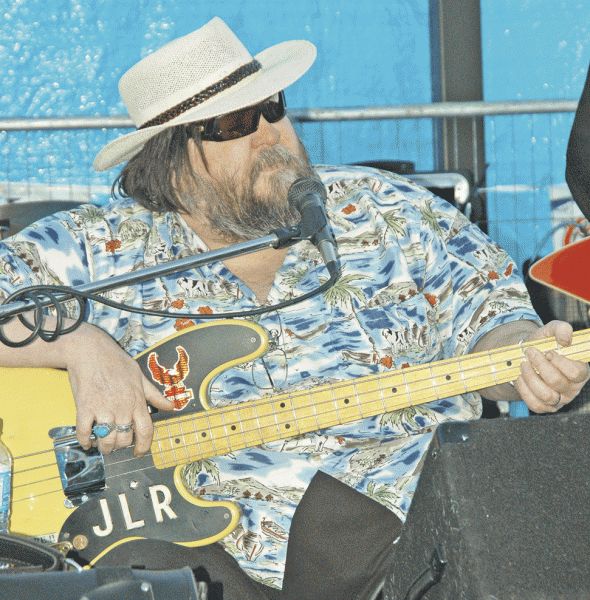Baker’s Bluesman
Published 12:34 pm Wednesday, July 1, 2015

- Baker's Bluesman
Jimmy Lloyd Rea Dies At 63
By Jayson Jacoby
jjacoby@bakercityherald.com
He was Baker City’s own bluesman, but Jimmy Lloyd Rea’s musical reputation went far beyond the town where he was born, a reputation forged in dark dingy bars and on brilliantly lit stages where he performed with blues legends like B.B. King and John Lee Hooker.
Rea, who had endured a series of health problems, including a kidney transplant in 2003, died Tuesday at St. Alphonsus Medical Center in Nampa, Idaho.
He was 63.
Rea is survived by his wife, Marydee, and four children: Georgene Rea, Marianne Stone, Francine O’Connell and Lloyd Rea III.
“Jimmy was a legend – not just in Baker City, but everywhere,” said Wayne Dyke, a Baker City drummer who was a back-up member of Rea’s longtime band, the Switchmasters, for almost a decade before becoming a permanent member in April 2014.
“What an awesome man,” Dyke said Tuesday morning. “I’m absolutely heartbroken and crushed right now.”
James Lloyd Rea Jr. was born on Oct. 6, 1951, at Baker.
His father, Lloyd Rea, served as Baker County judge (a position known today as chairman of the county board of commissioners) for 30 years.
In a 2003 interview with the Baker City Herald, Jimmy said he was just 5 when he started performing with his dad, who was a guitarist.
In a biography on Rea’s website – www.jimmylloydrea.com – he wrote that he started playing bass at age 9 and formed his first band, the Perils, when he was 15.
That’s about the time Mike Mallory of La Grande met Rea.
Mallory, a guitarist who has played in several Eastern Oregon bands, including the Mike Mallory Band and, currently, the Wasteland Kings, graduated from La Grande High School in 1971, one year after Rea earned his diploma at Baker High School.
As members of the “small pool” of local musicians it was perhaps inevitable, Mallory said, that he and Rea would become acquainted.
“We started playing together on and off,” Mallory said. “I got to watch him progress into a legendary bluesman.”
Mallory said he and Rea had talked during the 1970s about forming a band together, but the timing was never right.
Nonetheless, the pair, during a period in the early 1970s, did play together six nights a week at the Vip’s restaurant (now Denny’s) in La Grande.
Mallory said he and Rea also filled in with each other’s bands when needed.
“The thing that sticks out for me with Lloyd is that he was really one of a kind,” Mallory said.
He was unique both as a musician and as a personality, Mallory said.
Most bassists are content to avoid the spotlight and let the lead guitarist or the lead singer dominate the stage.
Well-known examples include John Entwistle of The Who, and John Paul Jones of Led Zeppelin.
But staying in the background wasn’t Rea’s way.
“He was an absolute force of nature type player,” Mallory said. “When you played with Lloyd it was like a merry-go-round. You just had to jump on and hold on and go where he was going. There was no way to stop that.”
Rea’s playing style was not only powerful, it was also “instantly recognizable,” Mallory said.
“If you heard five seconds of him playing you knew who it was, absolutely,” Mallory said. “In the music business that’s what you’re shooting for.”
Rea became a role model for younger musicians in part because he was a “triple threat,” Mallory said – he played, he sang and he wrote songs.
“For more than 40 years he was very dedicated to what he called ‘roadhouse blues,’ ” Mallory said.
But for all his prowess as a musician, Rea’s most lasting legacy, Dyke said, was as a friend.
“People flocked to him,” Dyke said. “And he loved kids – he always gave preference to them, talked to them before anybody else.”
Mallory said Rea’s personality was as forceful as his bass playing.
“He always made me laugh – 100 percent of the time when we had conversations, which was a couple of times a week,” Mallory said.
Back to Baker City
After attending Eastern Oregon University, Rea moved to Portland. He played in several bands before joining with Pete Karnes, a well-known blues harmonica player.
Rea also was a member of the band Canned Heat.
For much of the 1970s he toured with Canned Heat and other bands, a rigorous schedule that allowed him to meet, and perform with, a long roster of renowned blues musicians.
“I have been very fortunate to have stood and played on the bandstand with many of the true blues legends,” Rea wrote in the biography on his website.
In 1980 Rea returned to Baker City to raise a family with his wife, Marydee.
He started a band, Jimmy Lloyd Rea and the Switchmasters (named for his father’s Gibson Switchmaster guitar), and in 1982 he opened Rainbow Music store on Main Street downtown (the current site of Kicks sporting goods).
Although based in Baker City, the Switchmasters were fixtures in the thriving Portland blues scene during the 1980s and into the 1990s, said Peter Dammann, the artistic director for the annual Portland Waterfront Blues Festival.
Rea and his band played at that festival several times, and they were regulars at most of Portland’s blues bars, said Dammann, a guitarist who played for many years with Paul deLay, a Portland blues legend who died in 2007.
“We did a lot of gigs together,” Dammann said of Rea. “Fellow travelers of the blues circuit.”
See more in Wednesday’s issue of the Baker City Herald.


